WASHINGTON, October 28, 2020 — When COVID-19 vaccines become available in the United States, there won’t be enough to vaccinate everyone right away, and states will need to allocate them to their highest priority populations. A new tool provides state and county decisionmakers the region-specific data they will need to distribute vaccines to different populations based on available vaccine doses, priority populations, and vulnerable communities.
The Vaccine Allocation Planner for COVID-19 was jointly developed by Ariadne Labs, a joint center for health systems innovation at Brigham and Women’s Hospital and Harvard T.H. Chan School of Public Health; and Surgo Foundation, a nonprofit focused on solving health and social problems with precision.
The National Academies of Sciences, Engineering, and Medicine (NASEM) recently launched a set of vaccine allocation guidelines for the United States, identifying 13 high-priority populations to be vaccinated in phases:
- Phase 1A includes high-risk workers in health facilities and first responders.
- Phase 1B includes people with significant comorbid conditions and people living in congregate care settings.
- Phase 2 includes critical workers in other high-risk settings (public transit, grocery stores, etc.); teachers and school staff; people with moderate comorbid conditions; all older adults; people in homeless shelters or group homes; and incarcerated people or staff who work in jails.
- Phase 3 includes young adults; children; and the remaining critical workers.
- Phase 4includes anyone residing in the United States who didn’t have access to vaccines in prior phases.
The Vaccine Allocation Planner for COVID-19 helps state and county decisionmakers operationalize the NASEM guidelines, allowing users to obtain size estimates of the high-priority populations in their immediate regions and weight purely by this criteria, while also considering other factors like community vulnerability. It also helps users estimate the number of vaccine doses available; and the percentage of vaccine coverage achievable under various scenarios.
“State and local leaders are going to need to make decisions about how to distribute their allotted COVID-19 vaccine doses, and there are many permutations those decisions could take,” said Dr. Sema Sgaier, Executive Director of Surgo Foundation and adjunct assistant professor at Harvard T.H. Chan School of Public Health. “Our tool gives them the concrete, localized data they will need to estimate with precision and maximize the public health impact of the coronavirus vaccine, while at the same time prioritizing vulnerable populations.”
“In the midst of the pandemic, we will face a scarce supply of the COVID-19 vaccines. Nations, states and local municipalities are planning for effective vaccine distribution,” said Dr. Rebecca Weintraub, Director of Vaccine Delivery at Ariadne Labs and Associate Physician, Division of Global Health Equity at Brigham and Women’s Hospital in Boston. “Unfortunately, too often scarce resources go to the most privileged. We built this tool for leaders with the data they will need on available vaccine doses, priority populations, and at risk communities to plan for effective and equitable vaccine distribution.“
“Our committee laid out a four-phased, evidence based approach to COVID-19 vaccine allocation in the United States, but there will be a number of uncertainties around that allocation that state and local leaders must plan for,” said NASEM Committee Co-chair Dr. Helene Gayle, President and CEO of the Chicago Community Trust. “This tool helps them do that, providing the most reliable estimates of high-priority populations and allowing them to weigh that data against potential scenarios.”
Data for the Vaccine Allocation Planner for COVID-19 were sourced from the U.S. Census Bureau’s American Community Survey (ACS), the Bureau of Labor Statistics’ Quarterly Census of Employment and Wages (QCEW), California Office of Emergency Services, CDC’s National Health Safety Network (NHSN), Homeland Infrastructure Foundation-Level Data (HIFLD), Clark et al., 2020, and the Vera Institute of Justice.
Access the Vaccine Allocation Planner for COVID-19 at covid19vaccineallocation.org.
About Surgo Foundation
Surgo Foundation, based in Washington, D.C., is a nonprofit organization dedicated to solving health and social problems with precision. We do this by bringing together all the tools available from behavioral science, data science, and artificial intelligence to unlock solutions that will improve and save lives. We work in the United States and in low- and middle-income countries on issues like COVID-19, HIV/AIDS, tuberculosis, maternal mortality, health care, housing, and more.
About Ariadne Labs
Ariadne Labs is a joint center for health systems innovation at Brigham and Women’s Hospital and Harvard T.H. Chan School of Public Health. We develop simple, scalable solutions that dramatically improve the delivery of health care at critical moments to save lives and reduce suffering. Our vision is for health systems to deliver the best possible care for every patient, everywhere, every time. Visit ariadnelabs.org to learn more and covid19.ariadnelabs.org to learn about Ariadne Labs’ response to COVID-19.
This project is made possible with generous support from the Patrick J. McGovern Foundation.
Contacts
Media:
Bethany Hardy, bethanyhardy@surgofoundation.org, 202-277-3848
Brigid Tsai, btsai@ariadnelabs.org, 617-529-8345


